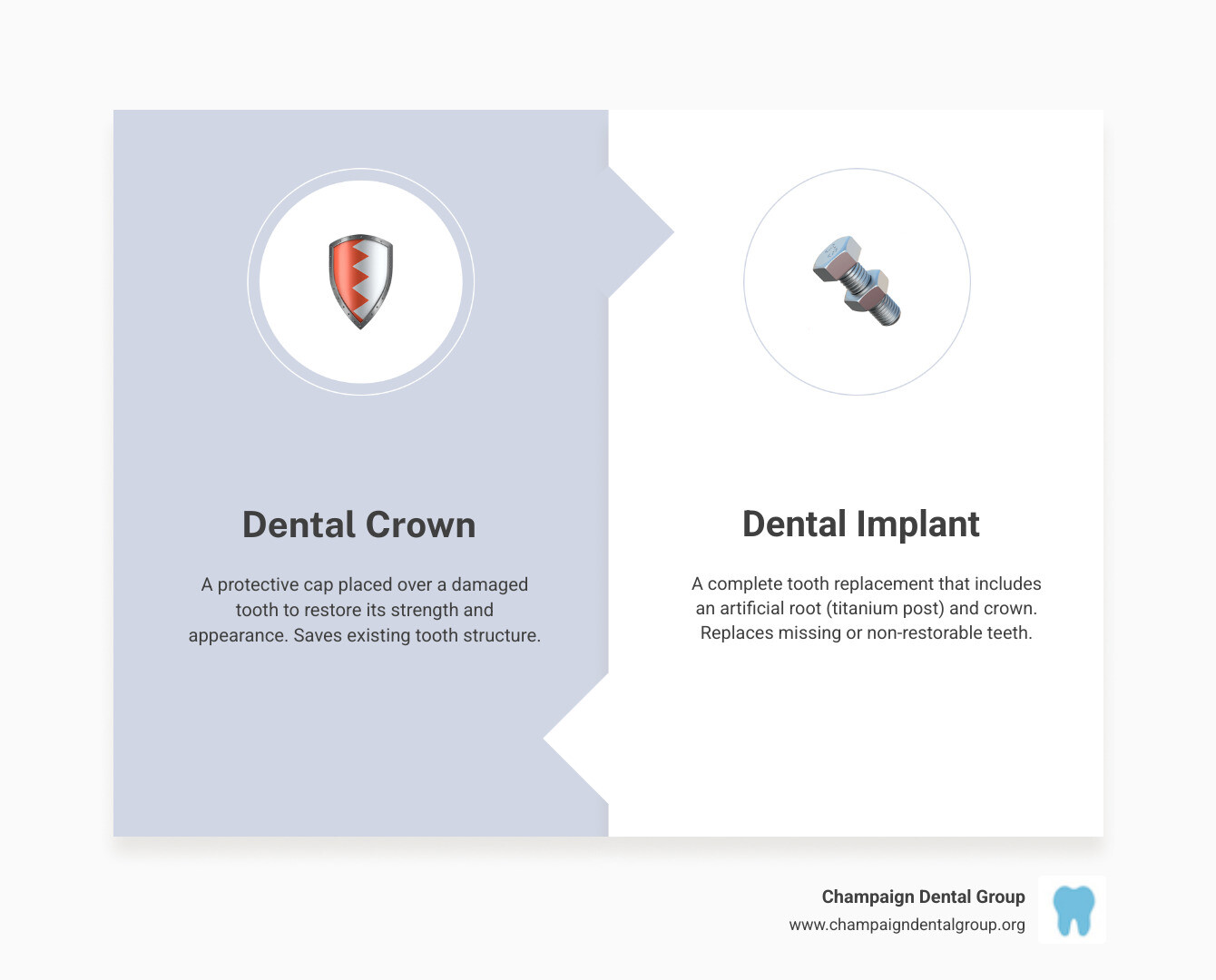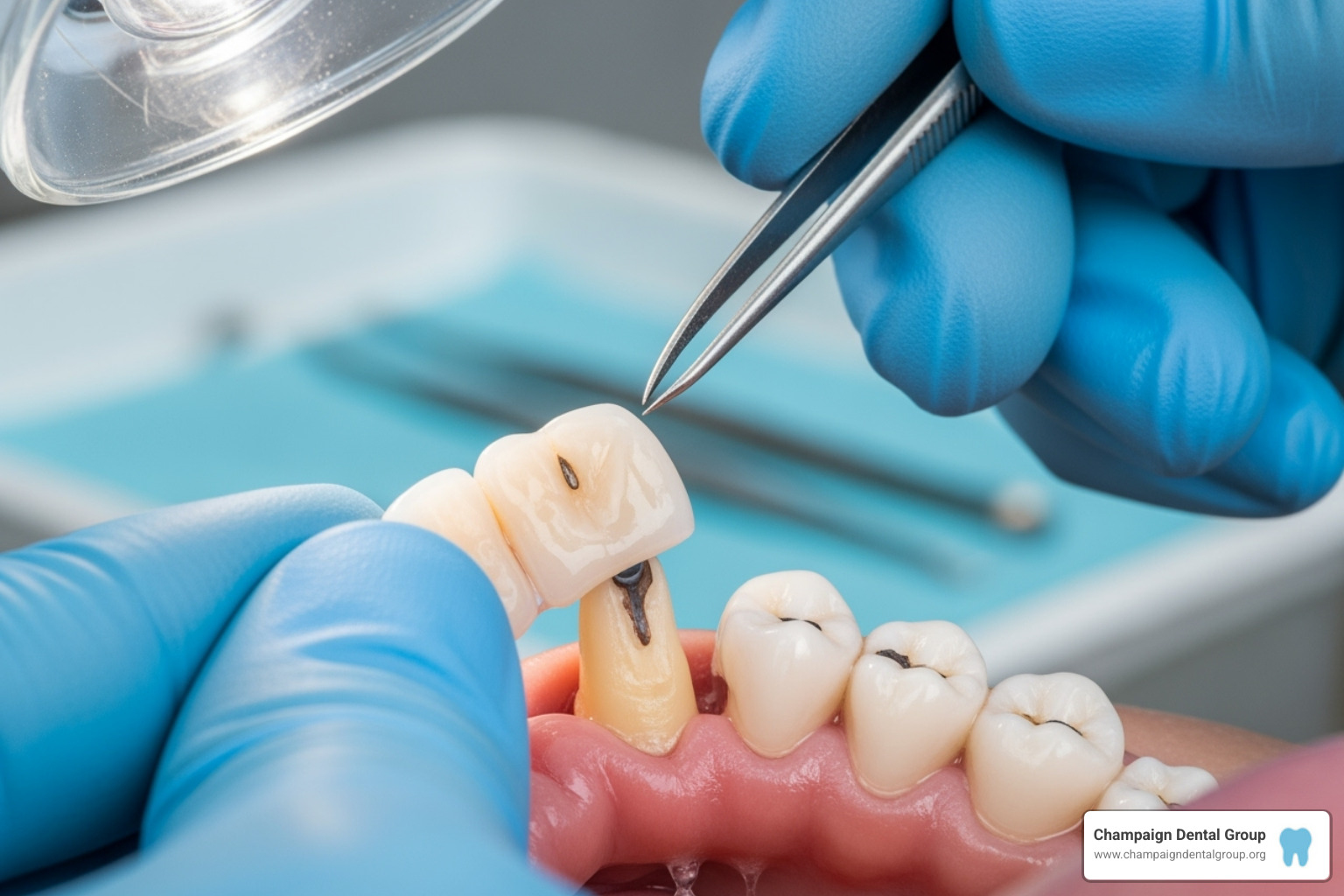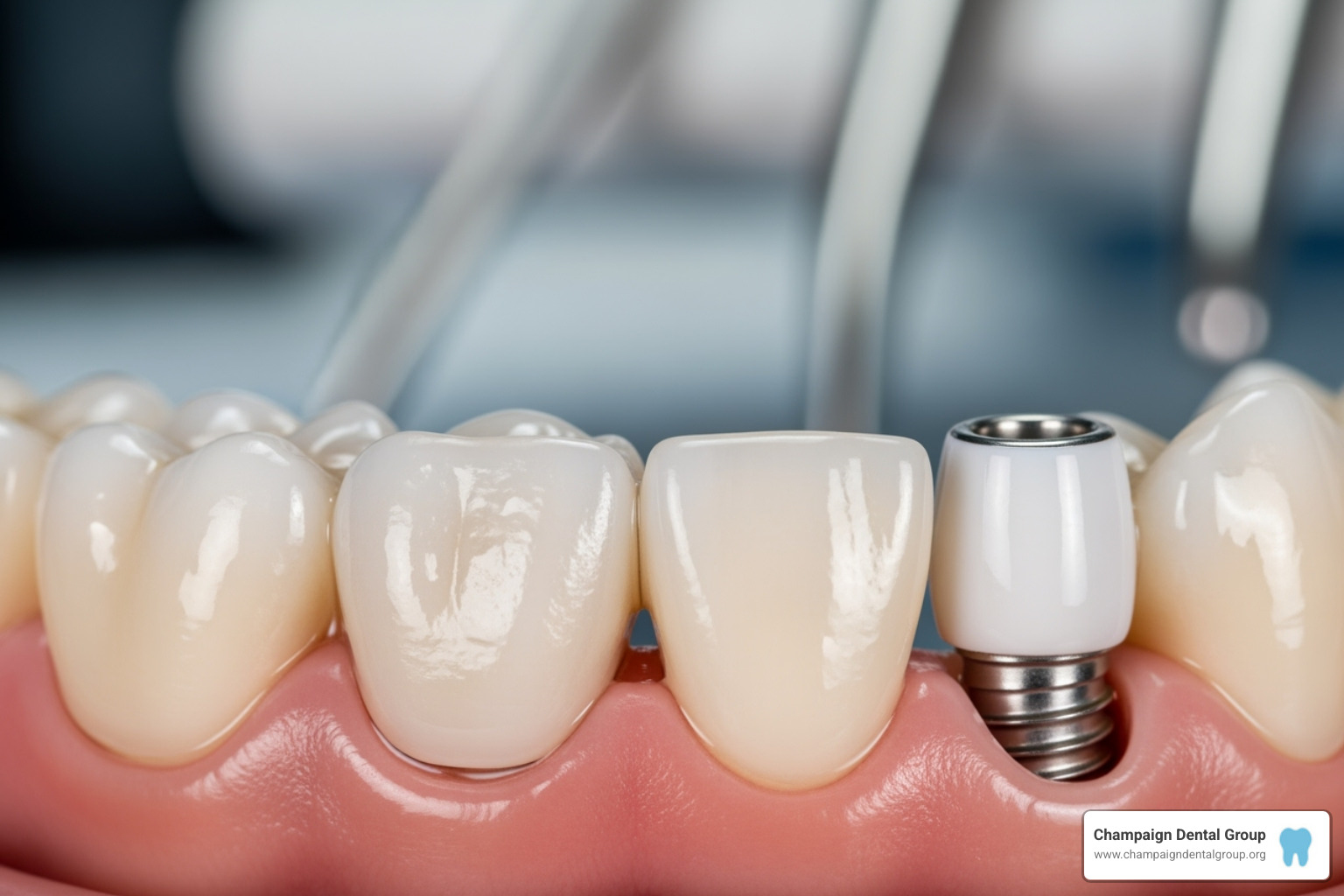Smile Confidently with Crowns and Implants Dentistry

Why Your Smile Deserves the Best Restorative Options
Crowns and implants dentistry offers two powerful solutions for restoring your smile when teeth are damaged or missing. Whether you're dealing with a cracked tooth, a large cavity, or tooth loss, these treatments can help you regain both function and confidence. The right treatment depends on your tooth's condition, your oral health, and your long-term goals.
Quick Overview: Your Restoration Options
- Dental Crown: A protective cap placed over a damaged tooth to restore its strength and appearance.
- Dental Implant: A complete tooth replacement that includes an artificial root (titanium post) and crown.
- Key Decision Factor: Crowns save existing teeth, while implants replace missing or non-restorable teeth.
- Longevity: Crowns last 10-15 years; implants can last 25+ years with proper care.
- Success Rate: Dental implants have a 97% success rate after 5 years.
At Champaign Dental Group, our experienced team uses state-of-the-art technology to provide compassionate, high-quality patient care. We offer convenient scheduling and comprehensive treatment options to fit your family's busy life.
For families seeking affordable care, our Smile Protection Plan makes quality dentistry accessible without insurance complications.

Understanding the Basics: Dental Crowns vs. Dental Implants
When restoring your smile, understanding the fundamental differences between dental crowns and dental implants is key. Both are excellent solutions offered in crowns and implants dentistry, but they serve distinct purposes.
What is a Dental Crown?
A dental crown is a custom-made, tooth-shaped cap placed over an existing tooth. Its purpose is to restore the tooth's strength, size, shape, and appearance. A crown is an ideal solution if you have a tooth that is severely decayed, cracked, chipped, or worn down. It acts as a protective shield, holding the damaged tooth together and preventing further issues. Crowns are also used to protect a tooth after a root canal, cover a large filling, or improve the look of a discolored or misshapen tooth. The primary goal of a crown is to save and strengthen your natural tooth.
For more information on how we can help you with your restorative needs, please visit our page dedicated to dental crowns and bridges:More info about our Crowns and Bridges services
What is a Dental Implant?
When a tooth is missing or too damaged to be saved, a dental implant is the premier solution. It replaces the entire tooth, from root to crown. The process begins with a small, biocompatible titanium post that our skilled team at Champaign Dental Group surgically places into your jawbone. This post acts as an artificial tooth root.
Over time, the jawbone fuses with the post in a process called osseointegration, creating a permanent and stable foundation. Once the post is secure, we attach a connector piece called an abutment. Finally, a custom-made crown is placed on the abutment, completing your new, fully functional tooth. Dental implants offer a permanent, stable, and natural-looking solution that feels like your own tooth.
Curious if a dental implant is the right choice for you? We've got more details to help you decide:The Advantages of Dental Implants: Is It Right For You?
The Core Difference: Saving a Tooth vs. Replacing a Tooth
The fundamental difference in crowns and implants dentistry lies in the primary goal:
- A dental crown saves an existing, damaged tooth. It reinforces a tooth that still has a healthy root.
- A dental implant replaces a missing or unsalvageable tooth. It provides a new root and crown where the natural tooth is gone.
If your tooth can be saved, a crown is often the best choice. If it's missing or must be extracted, an implant provides a complete and lasting restoration. Our compassionate team at Champaign Dental Group will help you determine which solution is right for your unique smile.
A Deep Dive into Crowns and Implants Dentistry
Choosing between a crown and an implant involves understanding the materials, procedures, and long-term outcomes. At Champaign Dental Group, we believe in walking you through all your options so you can feel confident in your decision.
Types and Materials of Dental Crowns
The material for your crown depends on the tooth's location, chewing forces, and aesthetic goals.
- Porcelain and All-Ceramic: Ideal for front teeth due to their natural appearance. They can be perfectly color-matched but are more delicate than other options.
- Zirconia: Offers an excellent balance of strength and aesthetics, making it suitable for both front and back teeth. It's durable and gentle on opposing teeth.
- Metal Alloys: Made from gold or other alloys, these are the most durable and rarely chip or break. Their metallic appearance makes them best for out-of-sight back molars.
- Porcelain-Fused-to-Metal (PFM): A strong metal base with a tooth-colored porcelain exterior. They are durable, but a metal line may become visible at the gum line over time.
- All-Resin: A budget-friendly option, but less durable and typically used as a temporary solution.
Our team will help you select the perfect material for your needs and lifestyle.Scientific research on various crown materials
Weighing the Pros and Cons
Making the right choice in crowns and implants dentistry means understanding how these treatments compare.
| Feature | Dental Crowns | Dental Implants |
|---|---|---|
| Primary Purpose | Restores and protects an existing damaged tooth. | Replaces an entire missing tooth, including the root. |
| Longevity | Typically 5-15 years with proper care. | Can last 15-30 years or even a lifetime with proper care. |
| Procedure Time | Generally 1-2 visits (1-2 weeks). | Multiple appointments over 3-9 months. |
| Jawbone Health | Does not directly stimulate jawbone. | Preserves jawbone health by stimulating the bone. |
| Invasiveness | Less invasive; prepares the existing tooth. | More invasive; requires surgical placement. |
| Decay Risk | The natural tooth underneath can still decay. | The implant itself cannot decay. |
| Cost | Lower initial cost. | Higher initial cost, but often more cost-effective long-term. |
Dental implants offer superior bone preservation. When a tooth is lost, the jawbone in that area begins to shrink. Implants are the only option that stimulates the jawbone like a natural root, preventing bone loss and maintaining your facial structure. Their durability is also impressive, with a 97% success rate after five years. Furthermore, implants can't get cavities, and they don't require altering adjacent healthy teeth.
Making the Right Choice for Your Smile
The decision is highly individual. A dental crown is the best choice when a damaged tooth has a healthy root system and simply needs protection or cosmetic improvement. It's a less invasive, faster, and more affordable upfront solution.
A dental implant is the superior option when a tooth is missing or cannot be saved. If you want the most durable, long-lasting replacement that preserves jawbone health and functions like a natural tooth, an implant is the gold standard.
The rule of thumb in crowns and implants dentistry is: if the tooth root is healthy, a crown is the conservative choice. If the root is gone or unsalvageable, an implant is the best investment for a complete restoration.Dental Implant Options: Your Guide for Replacing Missing Teeth
Exploring Alternatives to Crowns and Implants
While crowns and implants are often ideal, other options may suit your needs.
- Dental Bridges: These replace missing teeth using crowns on adjacent teeth as anchors. They are a fixed solution but require altering healthy teeth and don't prevent bone loss.
- Partial Dentures: A removable appliance that replaces missing teeth. They are less expensive and non-surgical but can be less stable and don't preserve the jawbone.
At Champaign Dental Group, we present all options clearly. Our Smile Protection Plan can make quality dentistry more affordable for families.Dental Implants Versus Bridges
The Patient Journey: What to Expect from the Procedure
Understanding your dental procedure can ease anxiety. At Champaign Dental Group, we use state-of-the-art technology and provide compassionate care to make your experience as comfortable and clear as possible.
The Dental Crown Process
Getting a dental crown typically requires two visits.
First Visit: Preparation
We begin by preparing the tooth, which involves removing any decay and reshaping it to ensure a perfect fit for the new crown. We then take a precise impression of the prepared tooth, which is sent to a dental lab where skilled technicians craft your custom crown. This process usually takes two to three weeks. Before you leave, we will place a temporary crown to protect the tooth.
Second Visit: Placement
When your permanent crown is ready, you'll return to our office. We will remove the temporary crown and check the fit and color of your new one, making minor adjustments as needed for a comfortable bite. Once you are happy, we permanently bond the new crown to your tooth with a strong dental adhesive, restoring your tooth's function and appearance.

The Dental Implant Process
The dental implant process is a multi-stage journey that provides a permanent solution for missing teeth. Our compassionate team at Champaign Dental Group will be with you every step of the way.
- Step 1: Consultation and Planning: Your journey starts with a thorough exam using X-rays and 3D imaging to assess your jawbone health. If needed, we may discuss bone grafting to ensure a solid foundation for the implant.
- Step 2: Implant Placement: Our skilled team surgically places the titanium implant post into your jawbone under local anesthesia to ensure your comfort.
- Step 3: Osseointegration (Healing): Over the next three to six months, the implant post fuses with your jawbone in a process called osseointegration. This creates an incredibly strong foundation, key to the implant's longevity.
- Step 4: Abutment Placement: Once fusion is complete, we attach a small connector piece called an abutment to the implant post.
- Step 5: Crown Attachment: After your gums heal, we take impressions for your custom crown. The final crown is then attached to the abutment, completing your new, fully functional tooth.
While the full crowns and implants dentistry process takes several months, patients are consistently thrilled with the natural-looking and feeling results.
More on the implant process from Cleveland Clinic
Longevity and Cost Considerations in Crowns and Implants Dentistry
Two common questions involve longevity and cost.
Longevity:
- Dental Crowns: Typically last 5 to 15 years with proper care.
- Dental Implants: The implant post can last 25 years or a lifetime, while the attached crown may need replacement after 10-15 years.
Cost:Dental implants have a higher initial cost due to the surgical procedure and materials. However, their longevity can make them more cost-effective over time compared to replacing a crown multiple times. An implant is a long-term investment in a permanent solution that prevents future issues like bone loss.
At Champaign Dental Group, we believe everyone deserves access to high-quality care. Our Smile Protection Plan is designed to make quality dentistry affordable for families without the hassle of insurance. We are always happy to discuss all financial options with you.
Understanding Dental Implants and Insurance
Long-Term Care and Key Health Considerations
After investing in your smile with crowns and implants dentistry, proper maintenance is essential for long-term success and your overall well-being.
Aftercare for Your New Smile
Caring for crowns and implants is much like caring for natural teeth. Our team at Champaign Dental Group will provide personalized guidance.

Key aftercare steps include:
- Brushing and Flossing: Brush at least twice a day and floss daily. For implants, it's crucial to clean around the base of the crown. Special tools like floss threaders or a water flosser can be very effective.
- Regular Dental Check-ups: Visiting us regularly allows our team to monitor your restorations and surrounding tissues, catching potential issues like gum disease or decay under a crown early.
- Mindful Eating: Avoid chewing on excessively hard or sticky foods like ice or hard candies to prevent damage to your new restorations.
While the restoration itself can't decay, the surrounding gums and any underlying natural tooth structure require diligent care.
The Impact on Jawbone Health
Dental implants offer a unique long-term health benefit that no other tooth replacement can. When a tooth is lost, the jawbone in that area begins to shrink due to a lack of stimulation. This bone loss can alter your facial structure and weaken adjacent teeth.
Because dental implants are placed directly into the jawbone, they function like natural tooth roots, providing the stimulation needed to prevent bone atrophy. This preserves your jawbone, maintains your facial structure, and supports a healthy smile for years to come. Crowns protect existing teeth but do not offer this direct bone-preserving benefit for missing teeth.
Whitening and Aesthetics for Crowns and Implants Dentistry
Achieving a seamless smile requires some planning. The materials used for crowns and implant crowns cannot be whitened like natural teeth. Their color is permanent.
For this reason, if you are considering teeth whitening, we recommend doing it before your restoration is made. This allows our team at Champaign Dental Group to perfectly color-match your new crown to your freshly whitened teeth, ensuring a beautiful and uniform smile. Our goal is to create a result so natural that no one will know it's not your original tooth.
Achieving Natural-Looking Dental Implants
Frequently Asked Questions about Crowns and Implants
We understand you have questions about crowns and implants dentistry. Here are answers to some common concerns we address at Champaign Dental Group, where our experienced team has provided compassionate care since 1997.
Is the dental implant procedure painful?
Patients are often concerned about pain, but the procedure itself is not painful. We use local anesthesia to completely numb the area, so you will not feel discomfort during the surgery. Most patients report that post-procedure discomfort is mild, manageable with over-the-counter pain medication, and that they return to normal activities within a day or two. Our compassionate team prioritizes your comfort throughout the entire process.
Can a tooth with a crown still get a cavity?
Yes. While the crown itself cannot decay, the natural tooth underneath is still vulnerable, especially at the gum line where the crown meets the tooth. Plaque can accumulate in this area, leading to cavities. This makes excellent oral hygiene—daily brushing and flossing—and regular dental check-ups essential to protect your investment and your oral health.
How successful are dental implants?
Dental implants have an outstanding success rate, around 97% after five years, making them one of the most reliable treatments in dentistry. Success depends on good bone quality, your overall health, and diligent aftercare. With proper oral hygiene and regular visits to Champaign Dental Group, your implant can last for 25 years or even a lifetime. Our experienced team uses state-of-the-art technology to ensure the best possible outcome for every patient.
Schedule Your Consultation for a Confident Smile
Deciding on the best way to restore your smile can feel like a big step. Whether you're considering a dental crown to protect a damaged tooth or an implant to replace a missing one, we understand you want to make the right choice for your unique needs.
That's exactly why a personal, professional evaluation is so important. At Champaign Dental Group, we believe in taking the time to truly understand your concerns and goals. Our wonderful team is dedicated to providing compassionate, high-quality patient care.
We use state-of-the-art technology to thoroughly assess your oral health, discuss all your options in crowns and implants dentistry, and work with you to find the perfect solution that will bring back your healthy, functional, and beautiful smile. We've been proudly serving the Champaign, Urbana, and wider Champaign County, OH community since 1997, building trust one smile at a time.
Ready to take the first step towards a more confident smile? We invite you to reach out to us today. Let's explore the possibilities together and start your journey to brighter, healthier teeth.
Request an appointment with us today to explore your options.
.jpg)